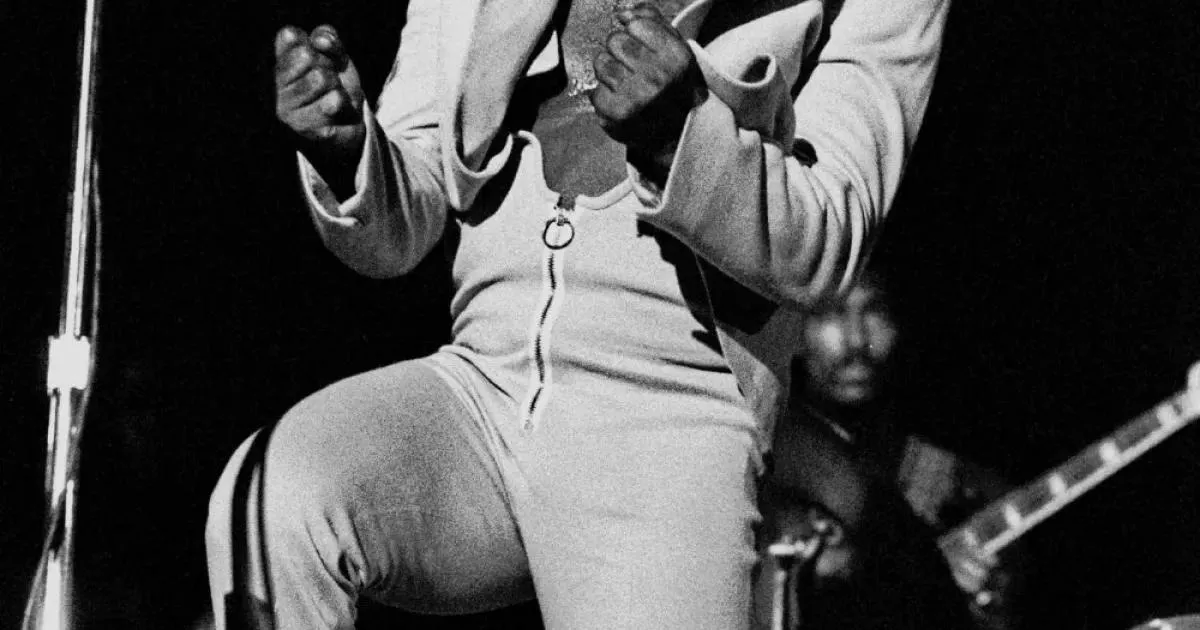James Brown, an iconic American singer, songwriter, dancer, and musician, is widely regarded as the "Godfather of Soul" and the central progenitor of funk music. Known for his energetic performances and relentless work ethic, he earned nicknames like "Mr. Dynamite" and "the Hardest-Working Man in Show Business." His influential career spanned over five decades, shaping the development of various music genres. Brown was among the first inductees into the Rock and Roll Hall of Fame in 1986, and his music has been extensively sampled, highlighting his enduring impact on music and popular culture.
1912: Joseph Gardner Brown's birth
In 1912, Joseph Gardner Brown was born.
1917: Susie (née Behling)'s birth
In 1917, Susie (née Behling) was born.
May 3, 1933: James Brown's birth
On May 3, 1933, James Joseph Brown was born in Barnwell, South Carolina, to Susie Behling and Joseph Gardner Brown.
1933: The Brown family lived in poverty in Elko, South Carolina
In 1933, the Brown family lived in poverty in Elko, South Carolina, which was an impoverished town.
1942: Billboard R&B charts analysis started
From 1942 to 2010, in Joel Whitburn's analysis of the Billboard R&B charts, Brown is ranked No. 1 in the Top 500 Artists.
1944: First appearance at Augusta's Lenox Theater
In 1944, James Brown first appeared at Augusta's Lenox Theater, winning the show after singing the ballad "So Long".
March 9, 1950: Adrienne Lois Rodriguez's Birth
March 9, 1950, marks the birthdate of Adrienne Lois Rodriguez, who later became James Brown's third wife.
June 14, 1952: Paroled from prison
On June 14, 1952, Brown was paroled and went on to work with both of Lawson's sons, and came back to visit the family from time to time throughout his career. Shortly after being paroled he joined the gospel group the Ever-Ready Gospel Singers, featuring Byrd's sister Sarah.
1953: Marriage to Velma Warren
In 1953, James Brown married Velma Warren, and they had one son together.
1954: Joined Bobby Byrd's group
In 1954, James Brown joined Bobby Byrd's group, which had evolved from the Gospel Starlighters to an R&B group called the Avons, marking a significant step in his early music career.
1954: Birth of Teddy Brown
In 1954, Teddy Brown, one of James Brown's five sons, was born.
1955: Contacted by Little Richard
In 1955, The group contacted Little Richard while performing in Macon. Richard convinced the group to get in contact with his manager at the time, Clint Brantley, at his nightclub.
March 1956: Release of "Please, Please, Please"
In March 1956, The Famous Flames released a re-recorded version of "Please, Please, Please" with King Records' Federal subsidiary in Cincinnati, Ohio. The song became the group's first R&B hit, selling over a million copies.
1957: Hired Ben Bart as manager
In 1957, James Brown replaced Clint Brantley as manager and hired Ben Bart, chief of Universal Attractions Agency. The original Flames broke up, after Bart changed the name of the group to "James Brown and His Famous Flames".
October 1958: Release of "Try Me"
In October 1958, James Brown released the ballad "Try Me", which became his first chart-topping R&B hit in the beginning of 1959.
April 24, 1959: Apollo Theater debut
On April 24, 1959, James Brown, the Flames, and his entire band debuted at the Apollo Theater, opening for Little Willie John.
1960: Started Multi-Tasking in Recording Studio
In 1960, James Brown began multi-tasking in the recording studio involving himself, his singing group, the Famous Flames, and his band.
1961: I've Got Money First 'rhythmic' shift
In 1961, "I've Got Money" features the first 'rhythmic' shift as one of the foundations of the Funk, played by Clayton Fillyau.
1961: Release of Two Albums with the James Brown Band
In 1961, James Brown released two albums with the James Brown Band earning second billing. With the Famous Flames, Brown sang lead on several more hits, including "Bewildered", "I'll Go Crazy" and "Think", songs that hinted at his emerging style.
October 24, 1962: Financed Live Recording at the Apollo
On October 24, 1962, James Brown financed a live recording of a performance at the Apollo and convinced Syd Nathan to release the album.
1962: Release of I've Got Money
In 1962, "I've Got Money" was released which features the first 'rhythmic' shift as one of the foundations of the Funk, played by Clayton Fillyau.
1962: Birth of LaRhonda Pettit
In 1962, LaRhonda Pettit, one of James Brown's extramarital children was born.
1962: Tammi Terrell Joins James Brown Revue
In 1962, Tammi Terrell joined the James Brown Revue. Brown became sexually involved with the 17 year old Terrell and physically abused her during their relationship.
1962: First Saw James Brown in San Diego
Tom Waits recalls that he first saw James Brown in 1962 at an outdoor theatre in San Diego and it was indescribable.
June 1963: Release of Live at the Apollo album
In June 1963, the album "Live at the Apollo" was released and became an immediate hit, eventually reaching number two on the Top LPs chart and selling over a million copies, staying on the charts for 14 months.
1963: Elaborate Introduction by Fats Gonder
In 1963, James Brown's personal MC, Fats Gonder, gave him an elaborate introduction accompanied by drumrolls before he appeared on stage. Gonder incorporated Brown's various sobriquets along with the names of many of his hit songs. This introduction was captured on Brown's 1963 album Live at the Apollo.
1963: Incident at Club 15
In 1963, during a concert at Club 15 in Macon, Georgia, James Brown, reportedly wielding two shotguns, allegedly tried to shoot his musical rival Joe Tex, leading to multiple people being shot and stabbed.
1964: Formation of Fair Deal production company
In 1964, James Brown and Bobby Byrd formed the production company, Fair Deal, linking the operation to the Mercury imprint, Smash Records.
1964: Birth of Venisha Brown
In 1964, James Brown's daughter Venisha Brown was born.
1964: Cape Routine in The T.A.M.I. Show
James Brown performs a version of the cape routine in the film of the T.A.M.I. Show (Teen Age Music International Show) in 1964 in which he and the Famous Flames upstaged the Rolling Stones.
1965: Released 'Papa's Got a Brand New Bag'
In 1965, James Brown released his song "Papa's Got a Brand New Bag", which became his first top ten pop hit and won him his first Grammy Award.
1967: Release of "Cold Sweat"
In 1967, James Brown released "Cold Sweat", considered by some critics to be the first true funk song, hitting number one on the R&B chart.
April 5, 1968: Free Concert at the Boston Garden
On April 5, 1968, a day after the assassination of Martin Luther King, Jr., James Brown provided a free citywide televised concert at the Boston Garden to maintain public order and calm concerned Boston residents. This was done over the objections of the police chief, who wanted to call off the concert. The show was later released on DVD as Live at the Boston Garden: April 5, 1968.
September 1968: Birth of Michael Deon Brown
In September 1968, Michael Deon Brown, another of James Brown's alleged sons, was born to Mary Florence Brown.
1968: Endorsement of Hubert Humphrey in 1968
During the 1968 presidential campaign, James Brown endorsed Democratic presidential candidate Hubert Humphrey and appeared with Humphrey at political rallies. Brown was labeled an "Uncle Tom" for supporting Humphrey and also for releasing the pro-American funk song, "America Is My Home".
1968: Recordings of "Give It Up or Turnit a Loose" and "Licking Stick-Licking Stick"
In 1968, James Brown recorded "Give It Up or Turnit a Loose" and "Licking Stick-Licking Stick", featuring a more developed version of his mid-1960s style.
1968: Release of "Say It Loud – I'm Black and I'm Proud"
In 1968, James Brown released "Say It Loud – I'm Black and I'm Proud", a hit song of social commentary.
1968: Release of "America Is My Home"
In 1968, James Brown, in response to a growing urge of anti-war advocacy during the Vietnam War, recorded the song, "America Is My Home". In the song, Brown advocated patriotism and exhorted listeners to "stop pitying yoursel[ves] and get up and fight". At the time of the song's release, Brown had been performing for troops stationed in Vietnam.
January 1969: Performance at Nixon's Inaugural Ball
In January 1969, James Brown began supporting Republican president Richard Nixon after being invited to perform at Nixon's inaugural ball.
1969: Divorce from Velma Warren
In 1969, James Brown and Velma Warren divorced, though they maintained a close friendship until Brown's death.
1969: Recording of "Funky Drummer"
In 1969, James Brown recorded "Funky Drummer", featuring a more developed version of Brown's mid-1960s style.
1969: Recording Social Commentary Songs
In 1969, James Brown recorded two more songs of social commentary, "World" and "I Don't Want Nobody to Give Me Nothing", the latter song pleading for equal opportunity and self-reliance rather than entitlement.
October 22, 1970: Marriage to Deidre "Deedee" Jenkins
On October 22, 1970, James Brown married Deidre "Deedee" Jenkins. The couple had two daughters together.
1970: Tammi Terrell's Death
In 1970, Tammi Terrell, who was James Brown's girlfriend before becoming famous as Marvin Gaye's singing partner in the mid-1960s, died. Her departure from Brown was attributed to her desire to escape his physical abuse.
1970: Recording "Get Up, Get into It, Get Involved"
In 1970, in response to some black leaders for not being outspoken enough, James Brown recorded "Get Up, Get into It, Get Involved" and "Talkin' Loud and Sayin' Nothing".
1971: Firing of J.B.'s Members
In 1971, James Brown fired Catfish and Bootsy Collins, members of the J.B.'s, after suspecting they were using drugs during a performance. The members intentionally took LSD during the show, violating Brown's drug-free policy.
November 1972: Boycott and Protests in Cincinnati
In November 1972, James Brown's endorsement of Nixon's campaign during the 1972 presidential election negatively impacted his career during that period with several national Black organizations boycotting his records and protesting at his concert shows; a November 1972 show in Cincinnati was picketed with signs saying, "James Brown: Nixon's Clown".
1972: Recording "King Heroin" and "Public Enemy"
As the 1970s continued, in 1972 James Brown continued to record songs of social commentary, most prominently "King Heroin" and the two-part ballad "Public Enemy", which dealt with drug addiction.
January 1973: Withdrawal from Youth Concert
In January 1973, James Brown was initially invited to perform at a Youth Concert following Nixon's inauguration but bailed out due to the backlash he suffered from supporting Nixon. Brown blamed it on "fatigue".
June 14, 1973: Death of Teddy Brown
On June 14, 1973, Teddy Brown, James Brown's eldest son, died in a car crash.
1974: Separation from Deedee Jenkins
In 1974, James Brown and Deedee Jenkins separated after years of domestic abuse.
1974: Release of "Funky President"
In 1974, James Brown composed the hit song, "Funky President (People It's Bad)", right after Gerald Ford took Nixon's place. This followed his composition of "You Can Have Watergate (Just Gimme Some Bucks And I'll Be Straight)" after reversing his support of Nixon.
1977: Attendance at Carter's Inaugural Ball
In 1977, James Brown openly supported Democratic President Jimmy Carter, attending one of Carter's inaugural balls.
July 16, 1978: Arrest After Apollo Performance
On July 16, 1978, James Brown was arrested after performing at the Apollo for reportedly failing to turn in records from one of his radio stations after the station was forced to file for bankruptcy.
1980: James Brown Concert in Boston
Around 1980, Rick Rubin saw James Brown in concert in Boston, describing it as one of the greatest musical experiences of his life. Brown's performance included dancing, singing, and playing a Hammond B3 organ with "Godfather" written across the front.
1980: Mention in The Police Song
In 1980, The Police refer to "James Brown on the T.A.M.I. Show" in their song "When the World Is Running Down, You Make the Best of What's Still Around".
January 10, 1981: Divorce from Deedee Jenkins
On January 10, 1981, James Brown and Deedee Jenkins divorced.
1982: Alleged Regular PCP Use
By the mid-1980s, it was widely alleged that James Brown was using drugs, with Vicki Anderson confirming that Brown's regular use of PCP began before 1982.
1983: Paternity Suit
In 1983, James Brown pleaded no contest to a paternity suit brought against him regarding Michael Deon Brown, though he never officially acknowledged Michael as his son.
1983: Induction into the Georgia Music Hall of Fame
In 1983, James Brown was inducted into the Georgia Music Hall of Fame.
1984: Marriage to Adrienne Lois Rodriguez
In 1984, James Brown married Adrienne Lois Rodriguez, marking his third marriage. The marriage would later become contentious.
1984: Support of Ronald Reagan's Reelection
In 1984, James Brown openly supported President Ronald Reagan's reelection.
1984: Regrets about "Say It Loud"
In 1984, James Brown stated he had regrets about recording "Say It Loud – I'm Black and I'm Proud", saying, "Now 'Say It Loud – I'm Black and I'm Proud' has done more for the black race than any other record, but if I had my choice, I wouldn't have done it, because I don't like defining anyone by race. To teach race is to teach separatism."
1984: Drug Use with Adrienne Rodriguez
In 1984, after marrying Adrienne Rodriguez, she and James Brown began using PCP together.
January 23, 1986: Induction into the Rock and Roll Hall of Fame
On January 23, 1986, James Brown was one of the first ten inductees into the Rock and Roll Hall of Fame, marking a significant recognition of his contributions to music.
1987: Arrest for Assault Against Adrienne Rodriguez
In 1987, James Brown was arrested on charges of assault against his third wife, Adrienne Rodriguez.
January 1988: Facing Criminal Charges
By January 1988, James Brown faced four criminal charges within a 12-month span relating to driving, PCP, and gun possession.
April 3, 1988: Arrest for Assault
On April 3, 1988, James Brown was arrested for assault.
April 1988: Arrest and CNN Interview
After an April 1988 arrest for domestic abuse, James Brown went on the CNN program Sonia Live in L.A. with host Sonia Friedman. The interview became notorious for Brown's irreverent demeanor, with some asserting that Brown was high.
May 1988: Arrest on Drug and Weapons Charges
In May 1988, James Brown was arrested on drug and weapons charges.
September 24, 1988: Arrest Following High-Speed Chase
On September 24, 1988, James Brown was arrested following a high-speed car chase on Interstate 20 near the Georgia–South Carolina state border.
1988: Rodriguez Files for Divorce
In 1988, Adrienne Rodriguez filed for divorce from James Brown citing years of cruel treatment. They later reconciled.
1988: Alleged Rape by Jacque Hollander
In January 2005, a woman named Jacque Hollander filed a lawsuit against James Brown, which stemmed from an alleged 1988 rape. Hollander alleged that the incident took place in South Carolina while she was employed by Brown as a publicist.
February 27, 1991: Parole Release
On February 27, 1991, James Brown was released on parole after serving two years of a six-year prison sentence for carrying an unlicensed pistol, assaulting a police officer, and various drug-related and driving offenses.
February 25, 1992: Lifetime Achievement Award at the Grammy Awards
On February 25, 1992, James Brown was awarded a Lifetime Achievement Award at the 34th annual Grammy Awards.
September 1993: Dedication of James Brown Soul Center of the Universe Bridge
In September 1993, the "James Brown Soul Center of the Universe Bridge" was officially dedicated in Steamboat Springs, Colorado, and James Brown appeared at the ribbon-cutting ceremony.
November 1993: Dedication of James Brown Boulevard
In November 1993, Mayor Charles DeVaney of Augusta held a ceremony to dedicate a section of 9th Street, renamed "James Brown Boulevard", in honor of James Brown.
1993: Joseph Gardner Brown's death
In 1993, Joseph Gardner Brown died.
1994: Lisa Rushton's Allegations
Between 1994 and 1999, former background singer Lisa Rushton alleged that James Brown demanded sexual favors, cut off her pay, and kept her offstage when refused. She claimed Brown touched her inappropriately and restricted her interactions with other men.
October 1995: Rodriguez Hospitalized After Assault
In October 1995, Adrienne Rodriguez was hospitalized after another assault by James Brown, during which he allegedly beat her with an iron pipe and shot at her car.
January 6, 1996: Death of Adrienne Rodriguez
Adrienne Lois Rodriguez, James Brown's third wife, died on January 6, 1996.
January 1996: Charges Dropped After Rodriguez's Death
In January 1996, charges against James Brown related to the assault on Adrienne Rodriguez were dropped after her death.
1996: Encyclopedia of African-American Culture and History
According to the Encyclopedia of African-American Culture and History (1996), as a vocalist, James Brown performed in a forceful shout style derived from gospel music, and "his rhythmic grunts and expressive shrieks harked back farther still to ring shouts, work songs, and field cries".
January 10, 1997: Star on the Hollywood Walk of Fame
On January 10, 1997, a ceremony was held to honor James Brown with a star on the Hollywood Walk of Fame.
1997: Super Bowl XXXI Halftime Performance
In 1997, James Brown performed in the Super Bowl XXXI halftime show.
January 1998: Rehab and Arrest
In January 1998, James Brown spent a week in rehab to deal with an addiction to unspecified prescription drugs and was arrested a week after his release for unlawful use of a handgun and possession of cannabis.
1998: Mary Simons' Accusations
In 1998, Mary Simons accused James Brown in a civil suit of holding her captive for three days, demanding oral sex, and firing a gun in his office, though the charge was eventually dismissed.
1999: Rushton Withdraws Lawsuit
In 1999, Lisa Rushton withdrew her lawsuit against James Brown.
1999: Interview with Rolling Stone
In 1999, during an interview with Rolling Stone, James Brown mentioned John F. Kennedy and Strom Thurmond as heroes of the 20th century, praising Thurmond's ability to keep young politicians in line.
June 15, 2000: Induction into the New York Songwriters Hall of Fame
On June 15, 2000, James Brown was inducted into the New York Songwriters Hall of Fame.
July 3, 2000: Incident with Electric Company Repairman
On July 3, 2000, police were summoned to James Brown's residence after he was accused of charging at an electric company repairman with a steak knife.
August 1, 2000: Signing of Last Will and Testament
On August 1, 2000, James Brown signed his last will and testament before J. Strom Thurmond Jr., which covered personal assets. An irrevocable trust was also created that year to handle music rights and business assets of James Brown Enterprises.
2000: Blues Brothers 2000 closing credits
Over the closing credits of the film Blues Brothers 2000 in 2000, James Brown performs a version of the cape routine.
2001: Birth of James Brown Jr.
In 2001, James Brown Jr. was born.
2001: Appearance in Beat the Devil
In 2001, James Brown appeared in Tony Scott's short film Beat the Devil, alongside Clive Owen, Gary Oldman, Danny Trejo and Marilyn Manson.
July 4, 2002: Performance at Outdoor Festival in Steamboat Springs
On July 4, 2002, James Brown returned to Steamboat Springs, Colorado, for an outdoor festival, performing with bands such as the String Cheese Incident.
August 6, 2002: Honored as First BMI Urban Icon
On August 6, 2002, James Brown was honored as the first BMI Urban Icon at the BMI Urban Awards.
December 23, 2002: Wedding Ceremony with Tomi Rae Hynie
On December 23, 2002, James Brown, 69, and Hynie, 33, had a wedding ceremony that was officiated by the Rev. Larry Flyer. However, controversy arose following Brown's death regarding the validity of the marriage.
2002: Creation of I Feel Good, Inc. Trust
In 2002, James Brown advised in his will that most of the money in his estate go into creating the I Feel Good, Inc. Trust to benefit disadvantaged children and provide scholarships for his grandchildren.
2002: Cameo Appearances in Films
In 2002, James Brown made a cameo appearance in the Jackie Chan film The Tuxedo and appeared in Undercover Brother, playing himself.
2002: Hollander's Claims Dismissed
When the case was initially heard before a judge in 2002, Hollander's claims against James Brown were dismissed by the court as the limitations period for filing the suit had expired.
June 24, 2003: Lifetime Achievement Award at the BET Awards
On June 24, 2003, James Brown appeared on the BET Awards and received the Lifetime Achievement Award presented by Michael Jackson, and performed with him.
August 2003: Public Announcement of Separation
In August 2003, James Brown took out a full-page public notice in Variety featuring Hynie, James II and himself on vacation at Disney World to announce that he and Hynie were going their separate ways.
December 7, 2003: Recipient of Kennedy Center Honors
On December 7, 2003, James Brown was a recipient of Kennedy Center Honors in recognition of his accomplishments as an entertainer.
2003: Pardon by South Carolina
In 2003, James Brown was pardoned by the South Carolina Department of Probation, Parole, and Pardon Services for past crimes committed in South Carolina.
2003: Fundraiser for National Republican Senatorial Committee
In 2003, James Brown was the featured attraction of a Washington, D.C., fundraiser for the National Republican Senatorial Committee.
January 2004: Arrest for Domestic Violence
In January 2004, James Brown was arrested in South Carolina on a domestic violence charge after Tomi Rae Hynie accused him of pushing her to the floor during an argument, causing scratches and bruises.
April 2004: Hynie's Annulment
In April 2004, Hynie's marriage to Javed Ahmed was annulled. However, this annulment occurred after she married Brown, creating legal issues regarding the validity of her marriage to Brown.
2004: Opening for Red Hot Chili Peppers
In 2004, James Brown opened for the Red Hot Chili Peppers at several Hyde Park concerts in London.
2004: Golden Plate Award from American Academy of Achievement
In 2004, James Brown received the Golden Plate Award of the American Academy of Achievement presented by Awards Council member Aretha Franklin.
2004: Successful Treatment for Prostate Cancer
In 2004, James Brown was successfully treated for prostate cancer. Despite his health challenges, Brown maintained his reputation as the "hardest working man in show business" by keeping up with his performance schedule in 2004.
2004: Ranked No. 7 on Rolling Stone's 100 Greatest Artists
In 2004, Rolling Stone magazine ranked James Brown as No. 7 on its list of the 100 Greatest Artists of All Time.
2004: Susie (née Behling)'s death
In 2004, Susie (née Behling) died.
January 2005: Jacque Hollander Filed Lawsuit
In January 2005, Jacque Hollander filed a lawsuit against James Brown, which stemmed from an alleged 1988 rape.
March 2005: Recording Sessions for Unreleased Album
In March 2005, James Brown participated in recording sessions for an intended studio album with Fred Wesley, Pee Wee Ellis, and other longtime collaborators. Although the album remained unreleased, a track from the sessions, "Gut Bucket", later appeared on a compilation CD included with the August 2006 issue of MOJO.
May 2005: Unveiling of James Brown Statue
In May 2005, the city of Augusta unveiled a life-sized bronze James Brown statue on Broad Street as a 72nd birthday present for Brown.
July 6, 2005: Performance at Live 8 Concert
On July 6, 2005, James Brown appeared at Edinburgh 50,000 – The Final Push, the final Live 8 concert, where he performed a duet with British pop star Will Young on "Papa's Got A Brand New Bag".
2005: Approval to Change Augusta's Slogan
In 2005, Charles "Champ" Walker and the We Feel Good Committee received approval to change Augusta's slogan to "We Feel Good".
2005: Inspiration from Gorgeous George
In his 2005 autobiography I Feel Good: A Memoir in a Life of Soul, James Brown credited wrestler Gorgeous George as the inspiration for both his cape routine and concert attire, stating that seeing George on TV helped create the James Brown you see on stage.
August 2006: "Gut Bucket" on MOJO Compilation CD
In August 2006, a track called "Gut Bucket" from James Brown's unreleased recording sessions in March 2005 appeared on a compilation CD included with the August 2006 issue of MOJO.
August 20, 2006: Performance at Festival of the Golden Gate
On August 20, 2006, James Brown's final major U.S. performance was in San Francisco as headliner at the Festival of the Golden Gate (Foggfest) on the Great Meadow at Fort Mason.
October 15, 2006: Ceremony for the Unveiling of the James Brown Arena
On October 15, 2006, James Brown attended a ceremony for the unveiling of the James Brown Arena, formerly the city's civic center.
October 27, 2006: BBC Electric Proms Concert
On October 27, 2006, James Brown played a full concert as part of the BBC's Electric Proms at The Roundhouse, supported by the Zutons, with special appearances from Max Beasley and the Sugababes.
November 14, 2006: Induction into the UK Music Hall of Fame
On November 14, 2006, James Brown was inducted into the UK Music Hall of Fame and performed at the ceremony.
November 2006: Induction into UK Music Hall of Fame
In November 2006, James Brown's last televised appearance was at his induction into the UK Music Hall of Fame, before his death in December.
December 2006: Traces of Cocaine Found
Prior to his death in December 2006, traces of cocaine were found in James Brown's urine when he entered Emory University Hospital.
December 23, 2006: Dental Appointment and Health Concerns
On December 23, 2006, James Brown arrived late to a dentist's office in Atlanta for dental implant work. The dentist observed that Brown looked weak and dazed and advised him to see a physician right away, raising concerns about his medical condition on December 23, 2006.
December 25, 2006: James Brown's death
On December 25, 2006, James Brown passed away.
December 28, 2006: Public Memorial Service at the Apollo Theater
On December 28, 2006, a public memorial service for James Brown was held at the Apollo Theater in New York City, attended by relatives, celebrities, and thousands of fans.
December 29, 2006: Private Memorial Ceremony in North Augusta
On December 29, 2006, a private memorial ceremony was held in North Augusta, South Carolina, with James Brown's family in attendance, following his death.
December 30, 2006: Public Memorial Service at the James Brown Arena
On December 30, 2006, another public memorial service was held at the James Brown Arena in Augusta, Georgia, following James Brown's death, with numerous celebrities and fans in attendance.
2006: Seven Decades of Funk World Tour
In 2006, James Brown continued his Seven Decades of Funk World Tour.
2006: Death from Pneumonia
In 2006, James Brown continued to perform and record until his death from pneumonia.
2006: Death from Congestive Heart Failure
In 2006, James Brown died at approximately 1:45 a.m. EST on Christmas Day, at age 73, from congestive heart failure, resulting from complications of pneumonia. His manager, Charles Bobbit, reported that Brown's last words were, "I'm going away tonight."
January 11, 2007: Reading of the Will
On January 11, 2007, during the reading of James Brown's will, it was revealed that his six adult living children were named in the document, but Hynie and James II were not mentioned as heirs.
January 24, 2007: Children File Lawsuit Regarding the Estate
On January 24, 2007, James Brown's children filed a lawsuit petitioning the court to remove the personal representatives from the estate due to perceived impropriety and alleged mismanagement of Brown's assets.
January 31, 2007: Hynie Files Lawsuit Against the Estate
On January 31, 2007, Hynie filed a lawsuit against James Brown's estate, challenging the validity of the will and the irrevocable trust, seeking recognition as Brown's widow, and requesting the appointment of a special administrator for the estate.
February 11, 2007: Grammy Awards Tribute
During the 49th Annual Grammy Awards presentation on February 11, 2007, James Brown was honored with his famous cape draped over a microphone and a performance of "It's a Man's Man's Man's World" by Christina Aguilera, followed by a dance routine by Chris Brown.
April 2007: Guardian Ad Litem Selected
In April 2007, Hynie selected a guardian ad litem whom she wanted the court to appoint to represent her son, James Brown Jr., in paternity proceedings.
May 2007: Posthumous Honorary Doctorate from Paine College (Scheduled)
James Brown was originally scheduled to receive an honorary doctorate from Paine College during its May 2007 commencement, but it was postponed.
August 2007: DNA Tests Reveal Extramarital Children
According to an August 2007 article in The Daily Telegraph, DNA tests indicated that James Brown fathered at least three extramarital children.
December 22, 2007: First Annual Tribute Fit For the King of King Records
On December 22, 2007, the first annual "Tribute Fit For the King of King Records" in honor of James Brown was held at the Madison Theater in Covington, Kentucky. Organized by Bootsy Collins, the tribute featured Tony Wilson as Young James Brown, with appearances by Afrika Bambaataa, Chuck D of Public Enemy, the Soul Generals, Buckethead, Freekbass, Triage and many of Brown's surviving family members. During the show, the mayor of Cincinnati proclaimed December 22 as James Brown Day.
2007: Posthumous Collaboration with Annie Lennox
Before his death, James Brown had been scheduled to perform a duet with singer Annie Lennox on the song "Vengeance" for her new album Venus, which was released in 2007.
2007: FBI File Released
In 2007, James Brown's FBI file was released to The Washington Post under the Freedom of Information Act, related Brown's claim that the high-speed chase did not occur as claimed by the police, and that local police shot at his car several times during an incident of police harassment, and assaulted him after his arrest.
2007: The Rolling Stones Tribute to James Brown
In 2007, as a tribute to James Brown, the Rolling Stones covered "I'll Go Crazy" from Brown's Live at the Apollo album during their European tour. Jimmy Page of Led Zeppelin acknowledged Brown's significant impact, stating he was a musical genre in his own right.
2010: Billboard R&B charts analysis ended
From 1942 to 2010, in Joel Whitburn's analysis of the Billboard R&B charts, Brown is ranked No. 1 in the Top 500 Artists.
2010: Called Greatest Musician of the Rock Era
In a 2010 article for Rolling Stone, Robert Christgau called James Brown "the greatest musician of the rock era".
April 14, 2012: The Famous Flames Retroactively Inducted into the Rock and Roll Hall of Fame
On April 14, 2012, The Famous Flames were automatically and retroactively inducted into the Rock and Roll Hall of Fame alongside James Brown, without the need for nomination and voting, on the basis that they should have been inducted with him in 1986.
August 2013: Induction into the R&B Music Hall of Fame
In August 2013, James Brown was posthumously honored and inducted into the R&B Music Hall of Fame at a ceremony held at Cleveland State University.
2013: Posthumous Induction into Rhythm & Blues Music Hall of Fame
In 2013, James Brown was posthumously inducted into the first class of the Rhythm & Blues Music Hall of Fame as an artist, honoring his contributions to music.
January 27, 2015: Hynie Ruled Legal Widow
On January 27, 2015, a judge ruled Hynie as Brown's legal widow, determining her status for the distribution of Brown's estate, based on the invalidity of her previous marriage and Brown's abandonment of annulment efforts.
February 19, 2015: South Carolina Supreme Court Intervenes in Estate Case
On February 19, 2015, the South Carolina Supreme Court intervened, halting all lower court actions in the estate of James Brown and undertaking to review previous actions itself.
2015: James Brown Tribute Box
In early 2015, ART THE BOX project led to the creation of the James Brown Tribute Box, designed and painted by Ms. Robbie Pitts Bellamy, located on the corner of James Brown Blvd. and Broad St. in Augusta, Georgia.
2017: Posthumous Induction into Rhythm & Blues Music Hall of Fame as a Songwriter
In 2017, James Brown was posthumously inducted into the Rhythm & Blues Music Hall of Fame as a songwriter, further cementing his legacy.
July 2018: Court of Appeals Rules Hynie Was Mr. Brown's Wife
In July 2018, the South Carolina Court of Appeals ruled that Hynie was, in fact, Mr. Brown's wife.
2018: Death of Venisha Brown
In 2018, Venisha Brown, one of James Brown's daughters, passed away.
February 2019: Investigation into Possible Murder
In February 2019, an investigation by CNN and other journalists led to suggestions that James Brown had been murdered.
June 17, 2020: Hynie Not Legally Married
On June 17, 2020, the South Carolina Supreme Court ruled that Hynie was not legally married to Brown due to her failure to annul her previous marriage, thus denying her any rights to his estate.
2020: SC Supreme Court Rules Hynie Was Not Legally Married
In 2020, the South Carolina Supreme Court ruled that Hynie had not been legally married to James Brown and did not have a right to his estate.
July 2021: Settlement Reached in Estate Battle
It was reported in July 2021 that James Brown's family had reached a settlement, ending the 15-year battle over the estate.
April 24, 2023: James Brown Inducted into Atlantic City Walk Of Fame
On April 24, 2023, James Brown was posthumously inducted into the Atlantic City Walk Of Fame, presented by The National R&B Music Society Inc. His daughter, Deanna Brown Thomas, accepted the honor at a ceremony in Brighton Park, Atlantic City, NJ. Bowlegged Lou of Full Force inducted Brown, along with other artists like Little Anthony & The Imperials, The Delfonics, and Grover Washington Jr.
2023: Rolling Stone Ranked Brown at No. 44
In 2023, Rolling Stone ranked Brown at No. 44 on their list of the 200 Greatest Singers of All Time.
Mentioned in this timeline

Chris Brown is a highly successful American singer songwriter rapper...

Michael Joseph Jackson the King of Pop was a highly...

Martin Luther King Jr was a pivotal leader in the...

John F Kennedy JFK was the th U S President...

Jackie Chan born Fang Shilong is a highly influential Hong...
Nigeria is a West African nation the most populous in...
Trending

40 minutes ago Tsitsipas criticizes ATP over broken promises and inhumane Masters 1000 format.

40 minutes ago Sarah Spain Describes Feeling 'Ill' Near JD Vance at Winter Olympics

2 hours ago Priyanka Chopra shines at Harvard, credits Bollywood stars for Hollywood success.

3 hours ago Civil Rights Icon Jesse Jackson Passes Away at 84: A Legacy Remembered

1 day ago Democrats and Europe grapple with Trump's impact; Newsom says Trump unified Europe.

3 hours ago Elise Mertens faces Emma Navarro in WTA Dubai 2026; Predictions and Odds
Popular
Randall Adam Fine is an American politician a Republican who...

Pam Bondi is an American attorney lobbyist and politician currently...

Kid Rock born Robert James Ritchie is an American musician...

Jesse Jackson is an American civil rights activist politician and...

Barack Obama the th U S President - was the...
The Winter Olympic Games a major international multi-sport event held...

